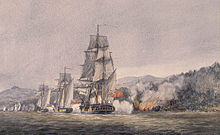David Hawley
| David Hawley | |
|---|---|

Royal Savage is shown run aground and burning while British ships fire on her during Battle of Valcour Island (watercolor by unknown artist, ca. 1925)
|
|
| Born | 1741 Stratford, Connecticut |
| Died | 1807 Stratfield |
| Allegiance |
|
| Service/branch |
|
| Years of service | 1776–1784 |
| Rank | Captain |
| Commands held |
Oliver Cromwell (1776) USS Royal Savage (1775) USS Schuyler (1777) USS Guilford (1779) |
| Battles/wars | |
David Hawley (1741–1807) was a captain in the Continental Navy and a privateer during the American Revolutionary War. He commanded Royal Savage in the 1776 Battle of Valcour Island, which is generally regarded as one of the first naval battles of the American Revolutionary War, and one of the first fought by the United States Navy.
Hawley was born into a Connecticut seafaring family in 1741. His parents were James and Eunice Hawley who lived in the Stratfield section of Stratford, Connecticut now Bridgeport. Hawley's grandfather was Gideon, his great grandfather was Ephraim and his great great grandfather was Joseph Hawley, a shipbuilder and the first of the name in America.
David Hawley was appointed a lieutenant on July 11, 1776 to serve on the state man of war Oliver Cromwell. At a meeting with the Governor of Connecticut and Council of Safety on August 16, 1776, it was voted to draw an order in favour of Captain David Hawley for 180 pounds to enable Hawley to raise a crew of seamen for the Naval Service of the United States of America on the Lakes to the northward, to which he was appointed Captain.
He served under Benedict Arnold at the Battle of Valcour Island on Lake Champlain on October 11, 1776. The battle is generally regarded as one of the first naval battles of the American Revolutionary War, and one of the first fought by the United States Navy. Hawley commanded the two-masted schooner USS Royal Savage with a crew of 50 men. His cousin Ephraim Hawley (1746–1777) served as his lieutenant and his young nephew Samuel Hawley was also a seaman. The ship ran aground during the battle and was burned by the crew to prevent it from falling into British hands. The Royal Savage had been Arnold's flagship until he went aboard the USS Congress. All of Arnold's personal belongings were destroyed when the Royal Savage was burned. This naval battle delayed for one year the British attempts to cut the colonies in half.
...
Wikipedia
